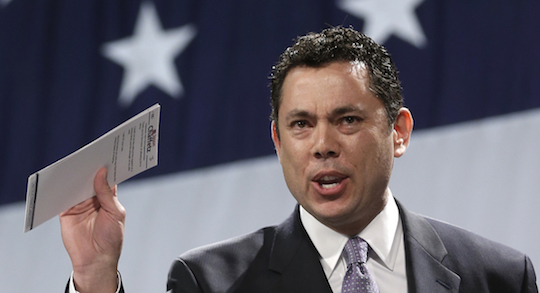Congressional Republicans have released their plan to replace the Affordable Care Act, and it is less than comprehensive. Andy Slavitt, former Acting Adminstrator for the Center for Medicare and Medicaid services under President Obama, described the plan as “basically a $600 billion tax cut funded by gutting Medicaid.” Although its architects claim it will preserve access for the millions of previously uninsured Americans who found coverage under Obamacare, it does away with the subsidies that let them buy it. When it was pointed out to Rep. Jason Chaffetz (R-UT) during an appearance on CNN’s New Day that “access doesn’t equal coverage,” the congressman implied that people who couldn’t afford insurance were spending irresponsibly. Quote:
You know what? Americans have choices. And they’ve got to make a choice. And so maybe, rather than getting that new iPhone that they just love and they want to spend hundreds of dollars on, maybe they should invest in their own healthcare.
Chaffetz’s father once owned part of a professional soccer team, so the representative may have a shaky notion of how much individual health insurance costs. Either that, or he’s playing an old card: poor people aren’t poor because of iniquity or an economy that doesn’t serve them, but rather because they spend unwisely. The poor have just as much money as everybody else! Assessment after the jump.
First of all, an iPhone costs much, much less than individual health insurance coverage. Without the usual discounts for signing a new carrier contract, a 256GB iPhone 7 Plus—currently the most expensive a person can buy—retails for $969. That’s a lot. But it’s nothing compared to health insurance.
The insurance policy that I bought on the individual market before Obamacare ran $262 a month. It didn’t cover doctor visits and carried a $35,000 deductible on my trick shoulder. It was purely for catastrophes, but even still, it cost me $3,144 a year. The policy I carry now, which I bought on the Montana insurance exchange and is much better, runs $460 a month. That’s $5,500 a year I pay for the privilege of not being bankrupted if I break my arm.
I’m not going to scrape together five or even three grand by foregoing iPhones. I could refrain from buying a used car and still not save enough to pay for health insurance. Chaffetz’s argument does not make sense, because individual health insurance is an order of magnitude more expensive than consumer goods. But he’s not arguing about policy or how his party’s plan might actually affect Americans. He’s arguing that people who can’t afford insurance don’t deserve it.
On a visceral level, most of us find something wrong with denying medical care to poor people. Refusing to put a woman’s dislocated shoulder back into the socket until she proves she can pay for it seems unethical, even cruel. The American system solves this problem by putting the shoulder back in and then charging the woman some huge sum—typically more than it would charge an insurance company footing the bill for the same services. This practice softens the appearance of cruelty by adding a layer of complexity, but it still demands money from our injured woman for months or even years afteward. She either submits to a period of indenture, during which she effectively works for whoever provided her care, or she foregoes other needs—not iPhones but food, rent or, more likely, health care.
But what if she totally had the money to pay for health insurance, and she spent it all on phones and drinks and sweatpants that say “juicy” on the butt? We would probably still balk at refusing to stitch her up when she was bleeding. But we might have fewer scruples about throwing her into bankruptcy afterward. She could have avoided it, after all, if she had been more responsible with her money.
Our price comparison between iPhones and individual health coverage already demonstrated that this idea is factually inaccurate. But even if the numbers made sense, would the ethics? Should the woman who spends her money unwisely and gets sick be condemned to lifelong poverty, while the woman who spends her money the same way but stays healthy is fine? The problem with the American system, even under Obamacare but especially under the changes Republicans propose, is that it magnifies the punishment for little mistakes in arbitrary and disproportionate ways.
So you bought a phone you didn’t need before you got meningitis. Do you deserve to go bankrupt? And even if the punishment fit the crime, would it do America much good to inflict it? Keeping swaths of the population at the poverty level is bad for the economy. Maybe, instead of chastising people who can’t afford insurance for buying iPhones, Chaffetz should try to imagine a system where people can afford insurance so easily that they buy a bunch of extra iPhones. That’s what we’re supposed to be working for, right—a robust economy where we’re all doing really great? Then again, maybe some of us are just out to get revenge on the poor.





You can’t get revenge on the poor because the poor can do no wrong. If something bad happens to you at the hands of the poor, it is you who erred. That’s a caricature of the progressive position, but I also think it’s a fair retelling of the rules governing their ethical calculation. For the caricature of the conservative position, see Rep. Jason Chaffetz (R-UT).
Since both positions have obvious shortcomings, I appreciate your recourse to systems thinking. To maximize society’s benefit, how should society punish or not punish people for their decisions? That is a helpful frame for getting beyond a dichotomy of automatic blame or exoneration of individuals based on income.